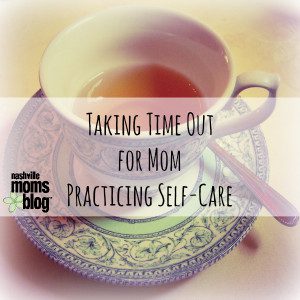She is a personal chef to a hungry family, a doctor to a child with an earache, a chauffeur to a ballerina, a security guard chasing away the scary things that lurk in the night. The roles a mother may play in one day seem to be limitless. In all this busyness, it can be a struggle to find a place to fit in time to for self-care. In my work as a counselor, when moms are asked about themselves, often they brush themselves to the side and put others in the place of highest importance. If these moms can find a free moment in their full schedules, they seem to find a way to fill that time with doing something for someone else. New moms can be especially prone to this behavior pattern as they struggle to find the balance between being the kind of parent they want to be versus the kind of parent depicted through (often unrealistic) societal expectations. While it is admirable to care for your family, doing so to the detriment of yourself is putting yourself—and possibly your family—at risk.
Stress, even from positive sources such as caring for children or family, can build up over time. Without outlets, this stress can become overwhelming. The point where the amount of stress a person experiences outweighs the coping skills they have in place, is often the place where mental health issues come into play. One key component of a mental health disorder is that it interferes with a person’s functioning. When the person who is struggling to function more days than not is a mom (and an important part of a family unit), then this can affect the rest of the family. When a mom struggles with an untreated mental health issue, she may find it takes a great deal of effort to interact with her family members or friends in the way she would like. She may isolate herself, cry frequently, struggle with energy and motivation, become more irritable, have frequent mood swings, experience sleep issues, feel nervous to the point that she doesn’t want to leave the home, have difficulty stopping repetitive behaviors or thoughts, or struggle with her own self-image. Children often learn from their parents and can pick up on changes in their parents’ behavior. Children noticing maladaptive behavior changes in their parents may mistake these changes as something they have caused. They may begin to act out or mimic the behaviors they see. This childhood exposure to maladaptive behaviors may play a part in a child’s own engagement in unhealthy behaviors as he or she ages.
Just as children may notice and mimic maladaptive behavior changes, they can also notice and mimic positive behaviors. In my practice, I often hear moms express feelings of guilt over the idea of doing something to care for themselves. Self-care activities are not about pampering or spoiling yourself! They are about relieving stress and helping your mind to function more clearly and efficiently. One of the best ways you can take care of your family is to teach healthy behaviors by example through establishing a self-care routine.
- Spend a little time thinking about you and the things you enjoy. Write these things down. Make sure that your list includes a lot of variety (things that can be done at home as well as outside of the house, things that require preparation as well as things that require little to no preparation, etc.).
- Identify support systems that you could enlist to help you take some time for yourself (friends, family, older children, mother’s day out programs, etc.).
- Make an effort to do at least one thing for yourself every day—even if it can only be for a few minutes at a time.
- As you begin to do things from your list, make a note of the activities that have the the longest lasting positive impact on your mood and your day as a whole. This can help you begin to use the few precious moments you find during your day for self-care in the most efficient way.
Regular self-care can help to prevent some mental health issues. It is important for moms who are overwhelmed or believe they may be struggling with a mental health disorder to know that they are not alone. Around 20% of moms are thought to experience mental health disorders during pregnancy or after childbirth. Seek out more information, talk to someone, and know that, with help, things can get better.
Sarah is offering Nashville Moms Blog readers a discount code on their initial interview at Maternal Counseling. Use the code momsmatter before January 31, 2015 to save 20%!
 Sarah Foy (M.Ed., LPC-MHSP, NCC) is a Tennessee native and the founder of Maternal Counseling, PLLC. She has attained the designation of Licensed Professional Counselor-Mental Health Service Provider and is licensed in the state of Tennessee to diagnose and treat mental health disorders. Having completed training through Postpartum Support International (PSI) and the 2020 Mom Project, Sarah has demonstrated a commitment to being well-informed on the subject of maternal mental health and providing support for the challenges involved in the transition to parenthood. Sarah specializes in working with adults and has experience incorporating evidence based therapy into the treatment of mood disorders, anxiety disorders, and other mental health disorders. Sarah has been working in the social services and mental health field since 2006 upon the completion of her Bachelors of Science in Psychology from Belmont University in Nashville, TN. Sarah’s passion for partnering with individuals in the work to restore their sense of well-being led her to complete her Masters Degree in Mental Health Counseling from Middle Tennessee State University in 2011.
Sarah Foy (M.Ed., LPC-MHSP, NCC) is a Tennessee native and the founder of Maternal Counseling, PLLC. She has attained the designation of Licensed Professional Counselor-Mental Health Service Provider and is licensed in the state of Tennessee to diagnose and treat mental health disorders. Having completed training through Postpartum Support International (PSI) and the 2020 Mom Project, Sarah has demonstrated a commitment to being well-informed on the subject of maternal mental health and providing support for the challenges involved in the transition to parenthood. Sarah specializes in working with adults and has experience incorporating evidence based therapy into the treatment of mood disorders, anxiety disorders, and other mental health disorders. Sarah has been working in the social services and mental health field since 2006 upon the completion of her Bachelors of Science in Psychology from Belmont University in Nashville, TN. Sarah’s passion for partnering with individuals in the work to restore their sense of well-being led her to complete her Masters Degree in Mental Health Counseling from Middle Tennessee State University in 2011.
















